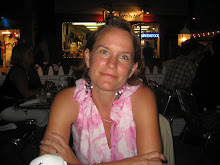

Hi all! Busy yesterday with a full plate of...well, food. We toured the very impressive Bilkent University, the first private university in Turkey, founded in the early 1980s and funded largely by a private doctor/philanthropist. The language of instruction there, and in a few other highly prestigious universities, is English. That was amazing to learn. And the "light lunch" they served us fooled us all. We thought the first plates were it: a cress and tomato salad (not small) and 2 rice/spice stuffed peppers with greens. Oh, and plates of bread. Not so. The main plate is pictured here. Then the whole thing was finished with either fruit (watermelon, apricots, cherries and honeydew) or custardy rice pudding. Holy mackerel. It's heaven, but a weighty one. My morning walk--executed to combat the near-constant eating--ended up being far longer than I'd planned. Lesson learned: better to really know the name of the neighborhood in which you're staying. I thought I knew, but I kept redirecting myself to the downtown area, oops. The plus side was that my walk took me to and around the beautiful Kocatepe Mosque, which I've shown here.
Our morning lecture at Bilkent was scintillating. The economics professor, Dr. Selin Boke, got her MA at Georgetown and PhD at Duke, and she gave us a 75 minute overview of the international economic crisis as it applies to Turkey. Fortunately for us, her presentation included data and explanations that pertained as much to the US (and the inception of the conflict) to provide meaningful context. Remember, few of us have a strong background in economics, myself included. I spoke with her over lunch--what a neat lady. She has a 5-year old son and says his example (Chinese toys) comes in handy for explaining the intricacies of international trade to her students. Funny, I do the same thing with Liv and Ruby. Several of my colleagues and I have remarked on the quality of the presenters here, especially the fact that so many of them are young(ish) women. They are so highly skilled, so articulate (in our language) and decidedly effective in communicating meaningful information to us as colleagues/learners. Wow.
OK--time for breakfast. We're heading to META (the Middle East Technical University) this morning. Full day. More adventures to follow!

Hey I just read in the Economist that tension between the Turkish Army and Government is promoting reform, do you have a take?
ReplyDeleteYes I just made the headline a question (no shame)
Geoff
I am thoroughly enjoying your blog and feeling seriously envious, especially of your culinary adventures!
ReplyDeleteGeoff--interesting that you should bring that article up. I've always held up the Economist as an example of Really Solid Journalism, assuming it was objective, intelligent, well-sourced and fully informed. Not so in the Turkish case, according to one of our lecturers (the anthropologist with the Harvard MA and PhD. It appealed to my shallow, name-dropping sensibilities.) Anyway, he explained that the NYTimes and Economist, and London's Guardian as well, all give a very mainstream Sunni perspective on "Turkish issues". The flaw in this, he pointed out, is that the 20-25% non-Sunnis (mostly Alevi, a group that's rarely talked about) tends to be politically opposed to some key mainstream (read: Sunni) positions, most notably on secularism. Alevis are strongly devoted to the left, and hold secularism dear to their hearts. They have more in common with Alevi Kurds and the occasional Sunni left-wingers than with mainstream Sunni Turks. I can't put the whole convoluted ideological map on the table, but suffice it to say there is much truth in the Economist article. It's just not the whole truth. Turkey is really, really interesting. Like, philosophically, politically and religiously (the balance between nationalism and secularism, populism and "democracy" is where the philosophy comes in)...you'd really dig this.
ReplyDelete